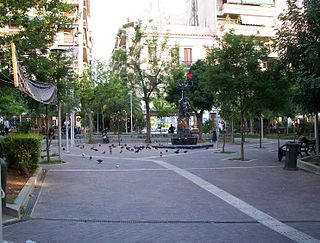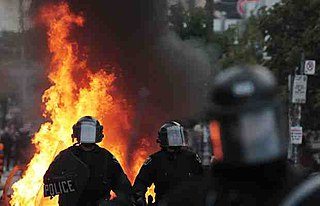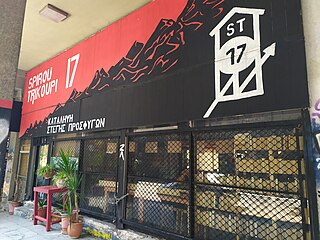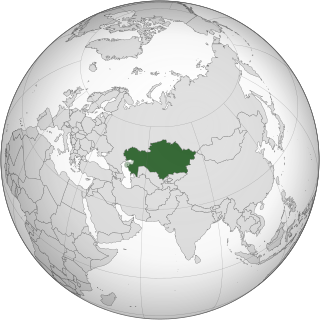
Squatting is the action of occupying an abandoned or unoccupied area of land or a building, usually residential, that the squatter does not own, rent or otherwise have lawful permission to use. The United Nations estimated in 2003 that there were one billion slum residents and squatters globally. Squatting occurs worldwide and tends to occur when people find empty buildings or land to occupy for housing. It has a long history, broken down by country below.

Parkdale is a neighbourhood and former village in Toronto, Ontario, Canada, west of downtown. The neighbourhood is bounded on the west by Roncesvalles Avenue, on the north by the CP Rail line where it crosses Queen Street and Dundas Street. It is bounded on the east by Dufferin Street from Queen Street south, and on the south by Lake Ontario. The original village incorporated an area north of Queen Street, east of Roncesvalles from Fermanagh east to the main rail lines, today known as part of the Roncesvalles neighbourhood. The village area was roughly one square kilometre in area. The City of Toronto government extends the neighbourhood boundaries to the east, south of the CP Rail lines, east to Atlantic Avenue, as far south as the CN Rail lines north of Exhibition Place, the part south of King Street commonly known as the western half of Liberty Village neighbourhood.

John Clarke is an anti-poverty activist who lives in Toronto, Ontario, Canada. As of 2019, he was teaching at York University.
The Safe Streets Act, 1999 (SSA) is a statute in the province of Ontario, Canada. The act prohibits aggressive solicitation of persons in certain public places. It also prohibits the disposal of "certain dangerous things" such as used condoms, hypodermic needles and broken glass in outdoor public places. It also amends the Highway Traffic Act to regulate certain activities on roadways. The act was enacted by the Progressive Conservative government of Mike Harris and received royal assent on December 14, 1999.

The Anti-Poverty Committee (APC) was a militant left-wing anarchist organisation based in Vancouver, British Columbia that campaigned against poverty and homelessness.

Exarcheia is a community in central Athens, Greece close to the historical building of the National Technical University of Athens. Exarcheia took its name from a 19th-century businessman named Exarchos who opened a large general store there. Exarcheia is bordered on the east by Kolonaki and is framed by Patission Street, Panepistimiou Street and Alexandras Avenue. Exarcheia is notorious for being Athens' historical core of radical political and intellectual activism. Exarcheia is often considered the anarchist quarter of Athens, known for its radical democracy.
Take Back the Land is an American organization based in Miami, Florida, devoted to blocking evictions, and rehousing homeless people in foreclosed houses. Take Back the Land was formed in October 2006 to build the Umoja Village shantytown on a plot of unoccupied land to protest gentrification and a lack of low-income housing in Miami. The group began opening houses in October 2007 and moved six homeless families into vacant homes in 2008. By April 2009, the group had moved 20 families into foreclosed houses. As of November 2008, the group had ten volunteers. Take Back the Land volunteers break into the houses, clean, paint, and make repairs, change the locks, and help move the homeless families in. They provide supplies and furniture and help residents turn on electricity and water. Though the occupations are of contested legality, as of December 2008 local police officers were not intervening, judging it to be the responsibility of house owners to protect their property or request assistance.

Public protesting and demonstrations began one week ahead of the 2010 G20 Toronto summit, which took place in Toronto, Ontario, Canada on 26−27 June. The protests were for various causes, including poverty and anti-capitalism.

The City is For All is a volunteer based grassroots organization founded in 2009. It operates in Budapest and Pécs in Hungary. Homeless and non-homeless activists work together for housing rights and social justice.

In England and Wales, squatting—taking possession of land or an empty house the squatter does not own—occurs for a variety of reasons which include needing a home, protest, poverty, and recreation. Many squats are residential; some are also opened as social centres. Land may be occupied by New Age travellers or treesitters.
Amy Miller is a Canadian film-maker. Previously a squatter and union organizer, she started making films in 2007. Her documentaries include Myths for Profit (2009), The Carbon Rush (2012), No Land No Food No Life (2013), Tomorrow's Power (2017) and Gaza: Health Under Siege (2018). She founded the production company Wide Open Exposure.

The 2016 Bendigo Street housing dispute concerned a series of occupations of houses in Collingwood, Melbourne, Australia. The properties were owned by the Victorian Government which had made aborted plans to construct the East West Link road. The houses, mostly on Bendigo Street, became the centre of a lengthy dispute between the government, Victoria Police and the Homeless Persons Union.

Athens refugee squats exist since the 2015 spike in the European migrant crisis. Greece has been a destination for migrants seeking refuge on the European continent via the "Balkan Route." Coalitions of solidarity groups and migrants have established squats throughout Athens to house refugees, demonstrating an alternative to solutions offered by the European Union and NGOs. The squats are grouped together in the Coordination of Refugee Squats. Notable projects included 5th School and City Plaza. In late 2019, the New Democracy party declared it would evict all the squats.

Focus E15 is a campaign group formed in London in 2013 by a group of mothers threatened with eviction from their emergency accommodation in a hostel for young homeless people in Newham. The group squatted empty flats on the Carpenters Estate in Stratford in September 2014, drawing widespread attention in the mainstream media. Most of the young women were eventually rehoused within the borough, as they had requested. Having won their own battle, they have continued to protest both against the local housing policy of Newham Council and for housing rights more generally. They have done so by occupying various buildings and supporting different individual struggles.

Squatting in the Republic of Ireland is the occupation of unused land or derelict buildings without the permission of the owner. In the 1960s, the Dublin Housing Action Committee highlighted the housing crisis by squatting buildings. From the 1990s onwards there have been occasional political squats in Cork and Dublin such as Grangegorman, the Barricade Inn, the Bolt Hostel, Connolly Barracks, That Social Centre and James Connolly House.
The COVID-19 protests in Canada are protests that began in April 2020, with protests in Vancouver, Toronto, Edmonton, and Ottawa against the Government of Canada's response to the COVID-19 pandemic and subsequent measures.

Under the 1977 Constitution of the Soviet Union, housing was guaranteed for every citizen and after Kazakhstan became a republic, a new housing code was established in 1992. From the 1980s onwards, many Kazakhs migrated to the largest city Almaty and squatted in shanty towns. In the 1990s, the Alma-Ata Union of the Homeless recommended to squatters that they should occupy unused land, summer homes or derelict buildings. When the authorities attempted to evict an informal settlement called Shanyrak in the mid-2000s there was a riot in which one police officer died; the poet Aron Atabek, who was chairman of Shanyrak's Land and Dwelling Committee, was arrested and imprisoned for 18 years. By 2016, estimates put the population of Shanyrak at 160,000 officially and at 220,000 when unregistered people were included.

Squatting in South Korea is the occupation of land or buildings without the permission of the relevant authorities. From the 1950s onwards, shanty towns called P'anjach'on formed around cities, in particular the capital Seoul. As well as providing housing, squatting is used as a tactic by groups opposing gentrification and striking workers.
Bonnie Briggs (1952/1953-2017) was a Canadian affordable housing advocate and poet. She created the Toronto Homeless Memorial in 1997.
The COVID-19 pandemic made homelessness in Toronto more visible, due to the rise of encampments in public parks. However, homelessness in Canada had been an issue of widespread concern long before the pandemic's arrival. A 2016 report found that at least 235,000 Canadians experience homelessness in a year, and 35,000 Canadians experience it on a given night. A Nanos survey found in 2020 that 72% of Canadians believed it was urgent to work toward ending homelessness in Canada. A 2020 report from the Wellesley Institute argues that there were disproportionately higher rates of evictions in Black neighborhoods, and that Black residents were among the worst hit by COVID-19. As part of its stay at home order in March 2020, the Ontario government instated a ban on evictions, however this was lifted with the emergency order in June 2020. The Ontario government however made evictions easier, according to some critics, due to its passage of Bill 184 which allowed landlords to bypass the Landlord and Tenant Board. One advocacy group deemed the cascading effects of Bill 184 'a bloodbath of evictions'. By December 2020, Toronto tenants were calling for a reinstatement of the moratorium on evictions. The crisis conditions of the pandemic lead to an increase in organizing against what many homelessness advocates deemed to be social murder of the city's unhoused. This ranged from legal lawsuits against the city's shelter system to calls for a city plan that would address the large numbers of unhoused people camping outside, to suits against encampment evictions, to large scale protests against the clearings of public parks. The Covid-19 encampments are best understood as emerging out of a longer history of urban informality in Toronto.














